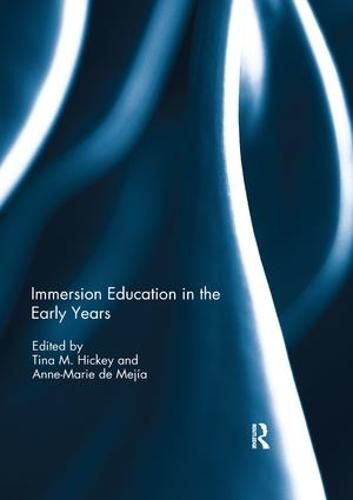Readings Newsletter
Become a Readings Member to make your shopping experience even easier.
Sign in or sign up for free!
You’re not far away from qualifying for FREE standard shipping within Australia
You’ve qualified for FREE standard shipping within Australia
The cart is loading…






Worldwide, more parents are opting for immersion pre-schooling for their children in order to benefit from its linguistic, educational, and cultural benefits. This immersion can be either bilingual or monolingual, aimed at early second language learning, or at language maintenance - offering minority language children mother-tongue support and enrichment. This book examines some of the key issues and policy concerns relating to immersion education in the early years. The term itself can be difficult in some political contexts, as can the differing outcomes noted by studies comparing monolingual programmes, and bilingual programmes for minority language children. The importance of training in immersion methodology for educators is discussed, as is the need to adapt preschool pedagogical practices to the immersion context, in order to provide optimal input for young language learners. One of the most pressing discussions surrounds differentiated provision - ensuring that the varying needs of children with language impairment, typical second language learners, and mother-tongue speakers with significant socioeconomic or linguistic disadvantages are all met. Overall, the book explores the challenges currently facing the sector, particularly with regard to training and professional development for practitioners, and the provision of appropriate materials in less widely used languages. Given the documented benefit of high quality immersion pre-schooling, this book fulfils an urgent need to increase the recognition of the sector. This book was published as a special issue of International Journal of Bilingual Education and Bilingualism.
$9.00 standard shipping within Australia
FREE standard shipping within Australia for orders over $100.00
Express & International shipping calculated at checkout
Worldwide, more parents are opting for immersion pre-schooling for their children in order to benefit from its linguistic, educational, and cultural benefits. This immersion can be either bilingual or monolingual, aimed at early second language learning, or at language maintenance - offering minority language children mother-tongue support and enrichment. This book examines some of the key issues and policy concerns relating to immersion education in the early years. The term itself can be difficult in some political contexts, as can the differing outcomes noted by studies comparing monolingual programmes, and bilingual programmes for minority language children. The importance of training in immersion methodology for educators is discussed, as is the need to adapt preschool pedagogical practices to the immersion context, in order to provide optimal input for young language learners. One of the most pressing discussions surrounds differentiated provision - ensuring that the varying needs of children with language impairment, typical second language learners, and mother-tongue speakers with significant socioeconomic or linguistic disadvantages are all met. Overall, the book explores the challenges currently facing the sector, particularly with regard to training and professional development for practitioners, and the provision of appropriate materials in less widely used languages. Given the documented benefit of high quality immersion pre-schooling, this book fulfils an urgent need to increase the recognition of the sector. This book was published as a special issue of International Journal of Bilingual Education and Bilingualism.